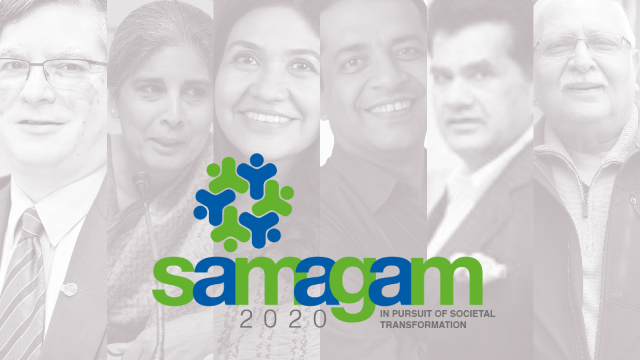
When Governments, Corporates, And CSOs Can Collaborate, Does It Pay To Be A Skeptic?
“I’m a collaboration skeptic,” said Anurag Behar, CEO of Azim Premji Foundation, prefacing his address at Samagam 2020.
My ears perked up. We were amidst civil society leaders, government officials, and the men and women of India’s biggest businesses were in attendance. Collaboration was the focus of discussion for the 2-day conclave. And here was the head of a major philanthropic enterprise testing the validity of the very same discussion.
The mood had shifted in the room (well, its virtual counterpart, since Samagam was hosted entirely online this year). Behar had planted a seed of—no, not doubt. Perhaps it was caution? Caution about self-congratulatory navel-gazing. Caution against distraction from the objective: working to uplift groups and populations by providing resources (corporates), conducting research and doing the legwork (civil society organizations), and providing institutional support for programmes (government bodies).
I see Behar’s point. I agreed when he said collaboration can’t stop at grant-giving or policy discussions. There’s got to be more to it. And while I sat mulling over his words, a second shift appeared. Mirai Chatterjee, whose reputation as leader of SEWA (Self-Employed Women’s Association) precedes her, threw into the mix her identity as a “collaboration optimist.”
It was a far easier idea to get behind. After all, I had spent the last two days hearing of the many successes that came from collaborations between Samaj, Sarkar, and Bazaar.
CARE India and the Bihar government actually increased the number of people accessing state healthcare facilities. Between 2005 and 2018, healthcare-seekers per facility rose dramatically from about 39 to 10,000.
Then there’s the role of civil society organizations in developing programs for the underserved: social audits, surveys, studies, collections of people’s demands produced by CSOs directly help governments monitor the effectiveness of their policies, plug the gaps, and design more measures to help deliver services.
In West Bengal, the MGNREGA has seen a high rate of success. The ‘person day’ (one day of work done by one person) that used to be 15 crore a year has now doubled and bodes well for employment statistics in the state.
But it was also during Dibyendu Sarkar’s evaluation of Usharmukti (West Bengal’s scheme to monitor MGNREGA implementation) that he cautioned us. He noted that certain work became isolated areas of excellence. “These islands,” he added, “need to be merged into a complete whole to create a mainland.”
It takes me back to the skeptic in Behar. Now, credit where it’s due. There’s no doubt about that. But what follows the exhibition of our successes? What follows the “fews” and “far-betweens”? And where do corporates, governments, and civil society organizations fall short? I can’t help but wonder if Samaj Sarkar Bazaar is yet to find a shared language; a grammar that draws more from the emotions and ambitions of underserved people than it does from the numbers and figures that come to define collaboration. I wonder if an uneven playing field, too, impacts the capacity to collaborate. I am, of course, reminded of Dr. Rajesh Tandon’s comments during his keynote address, about the alarming deficit of trust and mutual respect among collaborators. Does the State and Big Business look down at Civil Society organizations? Is there rampant disdain and irritation towards governments? And I think people aren’t always convinced by ‘Corporate Social Responsibility’.
Skepticism and optimism. Trust and condescension. There are so many things to grapple with when it comes to collaboration between the biggest players in our society. And I cannot say how or when change will happen. But I think the acknowledgement itself is a strong starting point.
Originally published on Democracy For All, PRIA.